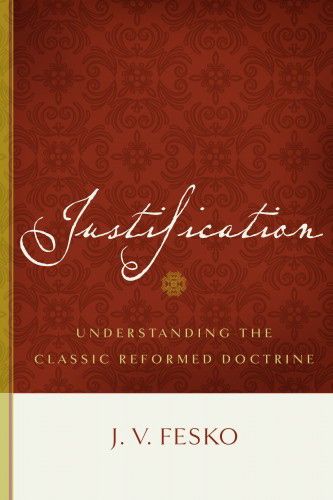
J. V. Fesko
Reviewed by: Brent Ferry
Justification: Understanding the Classic Reformed Doctrine, by J. V. Fesko. Published by P&R, 2008. Paperback, 461 pages, list price $29.99. Reviewed by OP pastor Brent Ferry.
John Fesko, a minister in the OPC, was recently added to the faculty at Westminster Seminary California. He also contributed to the OPC's justification report. Justification is a work of exegetical, biblical, systematic, historical, and polemical theology. It relates the doctrine of justification to fifteen subjects: church history, prolegomena, redemptive history, the covenant of works, the work of Christ, historical context, faith alone, the New Perspective on Paul, imputation, union with Christ, sanctification, the final judgment, the church, Roman Catholicism, and Eastern Orthodoxy.
The book is well written and timely. It reflects a conscious effort to uphold and defend the biblical doctrine of justification, with an eye on the entire theological encyclopedia. That is, Fesko's approach is theologically holistic.
Fesko states that the doctrine of justification, historically, has oscillated "between the two poles of antinomianism and neonomianism" (p. 54). He rightly contends that the Lutherans and the Reformed share the same doctrine of justification (justification through faith alone in Christ alone). Fesko does not interact with Peter Lillback's argument (in The Binding of God, p. 200) that the Reformed view of justification is a middle way between the Roman Catholic and the Lutheran views.
Regarding redemptive history, Fesko concludes that justification is historically "already," sanctification is "already" and "not yet," and glorification is "not yet." Justification is also eschatological, in that it is "the verdict of final judgment" brought into the present (p. 106).
Regarding the covenant of works, Fesko argues that Adam's work in the garden, by which we are condemned, typified the work of Christ, the eschatological Adam, by which we are justified. This section includes a critique of John Murray's rejection of the covenant of works.
I disagree with Fesko's treatment of union with Christ on several points. First, he contrasts the Lutheran and Reformed views by saying that Lutherans place union after justification, whereas the Reformed see union as underlying the entire order of salvation. It would be clearer to say that Lutherans place mystical union after justification, and that the Reformed place mystical union before justification (Shorter Catechism, 30).
Second, Fesko says that union undergirds the entire order of salvation (including justification), but then says that justification is the legal ground for union with Christ. Which is the ground of which? This confuses the reader.
Third, while I agree with Fesko that union with Christ must have a legal ground, he says that the legal ground is another part of the order of salvation, namely, justification. Contrarily, I believe the legal ground of mystical union is found not in the order of salvation, but in the history of salvation, namely, in the work of Christ (Rom. 8:34–35; 6:1–11).
December 28, 2025
December 21, 2025
December 14, 2025
December 07, 2025
November 30, 2025
November 23, 2025
November 16, 2025
© 2026 The Orthodox Presbyterian Church